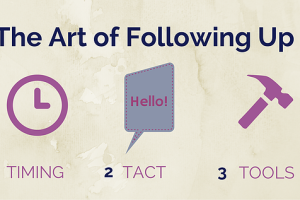Early on in a sales career, it’s easy to view sales is a solo job… after all; you are the only one responsible for your own quota, right? This attitude can’t be farther from the truth when you realize a company counting on your predictions and results. If you ‘miss’, the company misses, and the consequences could be dire for your career. In reality – that dream of climbing the corporate ladder might be better suited for midnight fantasies.
A cursory search through LinkedIn will yield about 6,500 chief revenue officers (CRO) registered — and about 4,800 of them are in the US. As Peter Ostrow from Aberdeen Group noticed, this title did not exist until some years ago. So, why is it here now?
Undoubtedly, job descriptions are evolving and so are the criteria for a promotion. Research by Aberdeen Group has shown that more and more sales leaders are focused on being able to predict the big picture rather than just meeting quota. For any sales leader aspiring to become one of the big C-level guys, the “sell now and think about profits later” attitude does not work any more. SVPs and EVPs of sales now need to be able to run a business within a business. And is there anything more imperative for a successful business than an accurate forecast?
The most successful companies are moving from top-down to bottom-up sales management style
Successful sales leaders earned their titles because they were able to predict, fulfill and even beat quota, thus earning promotions and moving up the ladder to reach the highest executive positions.
Self-confidence in a B2B environment, if well founded, is a great thing. In combination with great doses of work and ambition, it promises promotion to the coveted C-suite title. This is why the recently emerged CRO position is a great vehicle for any sales executive looking to get to the top of the ladder. However, corporate titles, as we all know, do not come to us just like that.
A July 2015 research by Aberdeen Group has detected a new trend in the sales management — moving from focusing on mere selling to a more margin-centric sales management. Sales leaders are quitting top-down management style and instead focusing on bottom-up, performance-based business approaches. The trend has moved from 35% companies using bottom-line sales management in 2014 to 58% in 2015.
Further research shows that the most successful companies report a 74% rate of profit-oriented sales management, which is by about 20% more than what their less successful counterparts achieved. If the Best-in-Class companies are acknowledging the importance of sales functions for generating profits, shouldn’t we consider adopting it?
Why is it so difficult to forecast accurately?
We have established why it is important that sales leaders are more business-centric. To achieve this, they need to turn to data-driven practices. Accurate forecasting might be the most important information that sales can convey to the rest of the company. However, just think how many times in the modern B2B environment have you heard someone say, “Never trust a salesperson’s forecast — it’s inevitably sandbagged or rose-colored.”
The fact is… nobody trusts sales department forecasts because they mostly turn to be inflated. All too often they are based on wishful thinking and personal aspirations rather than logic and data. To put it like this — it is nice that a sales leader radiates an air of confidence; however, to a company wanting to make any plans, that means nothing.
There are many factors involved:
- insufficient or inaccurate data about ongoing deals,
- overconfidence,
- lack of sales rep’s personal accountability on their personal forecast,
- lack of management enforcement regarding data,
- can’t understand the probability of closing current deals in play,
- no formal process identifying sales stages.
There is a clear trend here; in most cases, the human factor is to blame why B2B sales leaders cannot accurately predict their short- and long-term activities.
To be perfectly honest, most of the time, sales reps do not really have the motivation to invest their time and energy in predicting the future. They are more focused on keeping their jobs in the first place. However, things change if we introduce the above mentioned profit-centric sales management style. If sales leaders want to prove their value to the company and get that promotion, they should be able to do more than just hit the quota — they need to manage their part of the business efficiently. This means curbing the sale cost, and taking care of the bottom line.
Best-in-class companies rely on data to predict an accurate sales forecast
Precise forecast leads to better performance…. Research shows that Best-in-Class companies were better than their counterparts at predicting their success throughout all phases of the cycle. With this information at hand, sales leaders are able to make the best suitable management decisions. For example – to ensure closing deals that are halfway there, they can decide to allocate additional resources, such as improved product demos, more testimonials, and bring in the executives.
Top performers will politely dismiss the beliefs of individual sales reps and rely on data instead. B2B forecasting software come as a great help when deciding whether to resist the temptation of offering a discount to advance the sale. Moreover, companies that use sales analytics software are 93% better at knowing when to quit on a deal, 33% more efficient at grasping which sales are most and least likely to close and 27% more skilled at recognizing which deals need additional resources to give a final nudge towards closing the sale.
Data matters… use it to your advantage.









Speak Your Mind